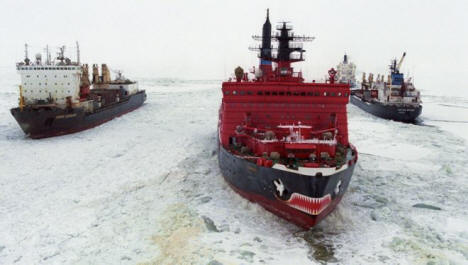|
|
|||
|
|
Subscribe to Time magazine in Pakistan
|
||
Pakistan's premier website that covers current affairs and news.
MIT Technology Review Subscription in Pakistan
Time magazine home delivery in Pakistan
Russia's Taymyr plan: Arctic coal for India risks pollution
Natural riches come in two conflicting types in Russia's Arctic north: valuable minerals and spectacular wildlife.

But sadly for many threatened species, the decline in Arctic sea ice has created a new economic opportunity for Russia in their remote habitat.
In a decree last year President Vladimir Putin ordered Russian firms to boost cargo traffic on the Northern Sea Route to an annual 80m tonnes by 2024.
Ambitious energy co-operation deals were signed with India in Vladivostok, in Russia's far east, in October.
One centres on a big open-cast coal mining project in the Taymyr Peninsula, in the far north of central Siberia.
A Russian icebreaker escorts cargo
The area is rich in high-quality coking coal (anthracite), used to make steel and aluminium.
Dharmendra Pradhan, India's Minister of Petroleum and Natural Gas, said: "We are the second largest coal importer in the world, and we intend to achieve production of 3m tonnes of steel per year by 2030, so we need to increase coal supplies."
But Taymyr is a haven for wildlife. It has Russia's largest nature reserve - Bolshoi Arkticheskiy - covering 4.2m hectares (16,200 sq miles).
On TV President Putin presents himself as a caring conservationist, famously relaxing in Siberia's unspoilt wilderness.
But he is also championing the expansion of fossil fuel projects in that wilderness
Russia is boosting trade with China, India and other growing Asian markets hungry for raw materials. Coal is to contribute to meeting that 80m-tonne target for Arctic deliveries, which will go via Russia's far east.
But such shipments pose considerable risks.
Despite global warming, icebreakers still play a key role, as winter temperatures plunge below minus 20C. Remote settlements lack equipment to deal with any pollution emergency. And long voyages to India will mean more greenhouse gas emissions from shipping
The Arctic is estimated to have 72% of Russia's total gas reserves. Oil and gas mega-projects are far advanced further west, notably on the Yamal Peninsula
Why Saudis are ardent social media fans
Human Mind is defeated... at last!
Dark Net: the dark side of internet
Subscribe to the New Scientist magazine in Pakistan
Share your views at feedback@newsflash.com.pk
Send your contributions at editor@newsflash.com.pk



